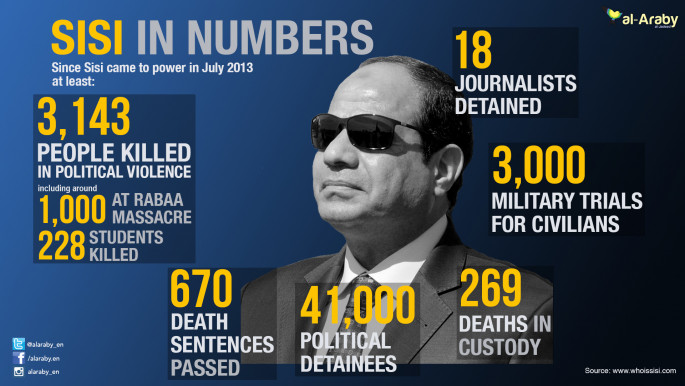Egypt court overturns death sentences for 149 detainees
An Egyptian court has overturned death sentences for 149 detainees charged with assaulting police officers in 2013.
2 min read
Egyptian judges have handed out mass death sentences [Getty]
An Egyptian appeals court overturned death sentences for 149 detainees, a judicial source said on Wednesday.
The court ordered a retrial for the defendants who were sentenced to death for allegedly attacking policemen near Cairo in 2013.
The alleged assaults occurred on the same day security forces massacred as many as 1,000 pro-Muslim Brotherhood protesters in the capital's Rabaa Square.
The initial ruling in February 2015 came amid a series of death sentences in mass trials that were criticised internationally.
Cairo's has cracked down on alleged supporters of the Muslim Brotherhood dishing out harsh punishments for members of the group.
The cases were presided over by infamous judge Nagy Shehata, known for handing out death and life sentences to hundreds of people at a time.
Human rights groups have described the judgements as "outrageous" and "politically-motivated" sham trials.
The court had also sentenced 37 people to death in absentia, but the defendants would have to hand themselves in for a retrial.
The grounds for the appeals court ruling were not immediately available, but the court has overturned hundreds of death sentences over the past year.
This has come as a relief to human rights advocates and frustration of some elements in the regime who have urged fast track executions.
Death row
In 2013, a military coup overthrew former President Mohamed Morsi, the country's first freely elected president.
It ushered in the worst domestic bloodshed in the country's modern history and led to former Defence Minister Abdel Fattah al-Sisi taking over as president.
On August 14, 2013, less than two months after the coup, police broke up two pro-Morsi protest camps in Cairo, killing hundreds of protesters.
Morsi himself is facing several trials and has already been sentenced to death in one case.
Several leaders of the Muslim Brotherhood, including its chief Mohammed Badie, have been sentenced to either death or lengthy jail terms with some overturned.

The court ordered a retrial for the defendants who were sentenced to death for allegedly attacking policemen near Cairo in 2013.
The alleged assaults occurred on the same day security forces massacred as many as 1,000 pro-Muslim Brotherhood protesters in the capital's Rabaa Square.
The initial ruling in February 2015 came amid a series of death sentences in mass trials that were criticised internationally.
Cairo's has cracked down on alleged supporters of the Muslim Brotherhood dishing out harsh punishments for members of the group.
The cases were presided over by infamous judge Nagy Shehata, known for handing out death and life sentences to hundreds of people at a time.
Human rights groups have described the judgements as "outrageous" and "politically-motivated" sham trials.
The court had also sentenced 37 people to death in absentia, but the defendants would have to hand themselves in for a retrial.
The grounds for the appeals court ruling were not immediately available, but the court has overturned hundreds of death sentences over the past year.
This has come as a relief to human rights advocates and frustration of some elements in the regime who have urged fast track executions.
Death row
In 2013, a military coup overthrew former President Mohamed Morsi, the country's first freely elected president.
It ushered in the worst domestic bloodshed in the country's modern history and led to former Defence Minister Abdel Fattah al-Sisi taking over as president.
On August 14, 2013, less than two months after the coup, police broke up two pro-Morsi protest camps in Cairo, killing hundreds of protesters.
Morsi himself is facing several trials and has already been sentenced to death in one case.
Several leaders of the Muslim Brotherhood, including its chief Mohammed Badie, have been sentenced to either death or lengthy jail terms with some overturned.






 Follow the Middle East's top stories in English at The New Arab on Google News
Follow the Middle East's top stories in English at The New Arab on Google News
![The UAE is widely suspected of arming the RSF militia [Getty]](/sites/default/files/styles/image_330x185/public/2024-11/GettyImages-472529908.jpg?h=69f2b9d0&itok=Yauw3YTG)
![Netanyahu furiously denounced the ICC [Getty]](/sites/default/files/styles/image_330x185/public/2024-11/GettyImages-2169352575.jpg?h=199d8c1f&itok=-vRiruf5)
![Both Hamas and the Palestinian Authority welcomed the ICC arrest warrants [Getty]](/sites/default/files/styles/image_330x185/public/2024-11/GettyImages-2178351173.jpg?h=199d8c1f&itok=TV858iVg)